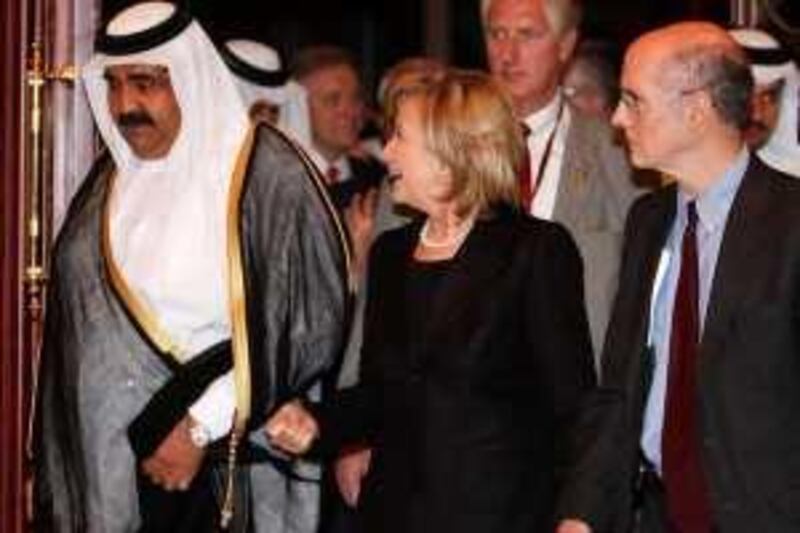DOHA // The US secretary of state, Hillary Clinton, called last night for greater pressure on Iran over its nuclear programme. "In his inaugural address, President Obama laid out a new era of diplomatic engagement, including with those nations that have at times been hostile to the United States," Mrs Clinton said. "President Obama and myself believe this is both a strategic imperative and a reflection of the values we share." But then she repeated the US perception that Iran has failed to prove that its nuclear programme is peaceful. "Iran leaves the international community with little choice but to impose greater costs for its provocative steps," Mrs Clinton said. "Together, we are encouraging Iran to reconsider its dangerous policy decisions. "We are now working actively with our regional and international partners in the context of our dual-track approach to prepare and implement new measures to convince Iran to change its course." The secretary's visit to Doha is part of President Obama's campaign to bolster regional support for new sanctions against Iran. A convoy of high-ranking US officials are arriving in the region. Admiral Mike Mullen, the chairman of the Joint Chiefs of Staff, passed through Egypt and Israel yesterday en route to Amman. This week, William Burns, the undersecretary of state for political affairs, will visit Syria and Lebanon with other high-ranking diplomats, and Gen David Petraeus, the commander of US forces in Iraq and Afghanistan, stops in Qatar. These visits follow recent stops in Israel by the national security adviser, Jim Jones, Dennis Ross, Mr Obama's special adviser on the Gulf countries, Leon Panetta, the CIA director, and Gen Kevin Chilton, the head of the US Strategic Command. Mrs Clinton heads to Saudi Arabia today, where she is expected to ask King Abdullah to offer a guaranteed gas supply to China, which imports much of its oil from Iran. In return, Beijing, the lone holdout among the five permanent members of the UN Security Council, would agree not to veto sanctions on Iran. For all the international effort to put pressure on Iran, the forum in Doha is aimed at fostering deeper exchanges between the United States and the Islamic world. "This new beginning is unprecedented in US history," said Farah Pandith, the US state department's first special envoy to Muslim communities. Since assuming her post in September, she has met thousands of Muslims across the world. "We understand that a Muslim in Dusseldorf is as Muslim as a Muslim in Dhaka - and all must be shown equal respect. This is pivotal." Most Muslim speakers at the forum agreed on the positive effect of Mr Obama's election. But many also expressed growing pessimism, citing election troubles and renewed violence in Iraq, a faltering war in Afghanistan and no progress in the Middle East. Shibley Talhami, a US academic of Arab origin, spoke of "diminishing hope and optimism about American policy" in the region. In a six-minute video address to the forum, Mr Obama named Rashad Hussain, a White House lawyer, as the next US envoy to the Organisation of the Islamic Conference. He also reiterated his commitment to working to end the Israeli-Palestinian conflict. "It has only been eight months since Cairo, and much remains to be done," the president said. "But I believe we've laid the groundwork to turn those pledges into action." Mrs Clinton said the United States remained "determined to settle this conflict once and for all." "I know people are disappointed that we have not yet achieved a breakthrough. The President, Senator Mitchell, and I are also disappointed," she said in Doha. "But we need to remember that neither the United States nor any country can force a solution. The parties must resolve their differences through negotiations." Mrs Clinton said "the goal of a comprehensive peace is fully in the interests of the United States - We are committed to our role in ensuring that negotiations begin and succeed." She also called for help. "We don't have any magic wands we can wave. President Obama's vision was not borne of a single country seeking to writing a new chapter on our own. It was a call for all of us to take responsibility for retiring stereotypes and outdated views." Earlier in the day, Mrs Clinton met with the Qatari emir, Hamad bin Khalifa al Thani, and Sheikh Hamad bin Jassim al Thani, the prime minister, to discuss Iran and Middle East peace. She also met with the Turkish prime minister, Recep Tayyip Erdogan. The Turkish foreign minister is expected to visit Iran this week, and it is believed Mrs Clinton wished to have US and Turkish intentions aligned. The only Nato member that borders Iran, Turkey is against sanctions, believing the row can be defused diplomatically. Last week, the Iranian president, Mahmoud Ahmedinejad, announced an effort to enrich up Iran's nuclear fuel to a 20 per cent level suitable for powering a medical research reactor in Tehran. Yesterday, Mr Erdogan reiterated that Turkey is willing to serve as the site for any nuclear fuel exchange. "The threats facing our world today do not really concern one country alone," Mr Erdogan said, "but all of us." dlepeska@thenational.ae
Clinton raises the pressure on Iran
Secretary of state leads diplomatic offensive in the region, saying Tehran leaves the world 'little choice' but to impose greater sanctions.

More from the national






